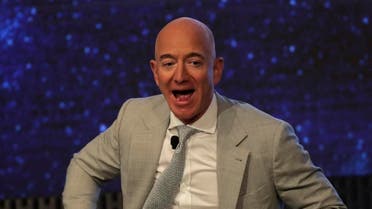Jeff Bezos-Saudi phone hack: The fake conspiracy theory explained
In January 2020, the world’s richest man, Jeff Bezos, helped spin a bizarre narrative – that Saudi Arabia was behind the hacking of the Amazon boss’s phone, leading to leaked texts and photos of his extramarital affair.
At the time, Saudi officials were quick to point out the lack of evidence behind of the claim. Saudi Foreign Minister Prince Faisal bin Farhan told Reuters that the claim was “absolutely silly.”
“I think absurd is exactly the right word,” he added.
For the latest headlines, follow our Google News channel online or via the app.
The conspiracy, supported by a 2,000-word blogpost posted by Bezos, suggests Saudi Arabia helped US tabloid the National Enquirer secure photos and texts of Bezos’ affair with married helicopter pilot and former TV anchor Lauren Sanchez.
Earlier this month, Bloomberg posted an excerpt of a new book focused on this story, written by reporter Brad Stone and titled “Amazon Unbound.”
“There would later be an abundance of speculation about how the Enquirer got the Bezos-Sanchez story—including unproven allegations that Sanchez’s ex-husband, Patrick Whitesell, was involved, as well as international intrigue involving Saudi Arabia,” Stone wrote.
The book goes on to note that there is no “conclusive evidence” to support this theory.
The suggestion here, as such, is that Bezos deliberately sought to forge a counternarrative to his extramarital affair, and that through accusing Saudi Arabia and the Trump administration of their involvement in the leaks he could cast himself as a victim of a politically motivated hit.
The reality, however, is much simpler. The National Enquirer paid the brother of Lauren Sanchez, Bezos’ mistress, $200,000 for the photos and texts, Stone wrote.
The possibility that Saudi Arabia had told the Enquirer about the affair, or supported information sourced to Michael Sanchez, was “only a fog of overlapping events, weak ties between disparate figures and more strange coincidences,” Stone wrote, according to the NY Post.
Time for accountability
At the time, US media had supported the story, before changing their stance when new evidence came to light. CNN, having previously described the story as a “revelation,” acknowledged that the report was flawed. Even Bezos’ Washington Post was forced to acknowledge that the security expert “questioned the forensics report upon which UN officials are basing their conclusions.”
In the wake of the new revelations in Stone’s book, some have called for those that peddled the false narrative to be held accountable.
“Now that the truth about the so-called “Bezos Hack” has been revealed, will those who accused the Kingdom and cast aspersions upon it come forward and acknowledge their mistake?” Saudi Arabia’s State Minister for Foreign Affairs, Adel al-Jubeir, said on Twitter earlier this month in response to the new information.
The Saudi US embassy also called for journalists in the US media and the former UN rapporteur “to be more responsible in their reporting and to investigate claims no matter their source.”
As we have said, reports that the Kingdom leaked Mr. Bezos’ personal photos were absurd. Now that the truth is out, we call on journalists in the U.S media & the former U.N rapporteur to be more responsible in their reporting and to investigate claims no matter their source. https://t.co/XcTe7zwoKb
— Saudi Embassy (@SaudiEmbassyUSA) May 8, 2021
False from the start
Cyber security experts had already cast doubt on the veracity of the claim. After analysing Bezos’ phone, experts found that no known malware had been detected. Al Arabiya English had also previously reported on the lack of evidence behind Bezos’ claim.
The allegation of Saudi Arabia’s involvement had been made in a report published in November 2019 by Washington-based consultancy FTI Consulting, which concluded with “medium to high confidence” that Bezos’s iPhone X was compromised via malware they allege originated from a video sent by Saudi Crown Prince Mohammed bin Salman to Bezos on May 1, 2018.
The report was commissioned by Bezos and later leaked by US media outlet Vice.
UN special rapporteurs, Agnes Callamard and David Kaye, came out in support of the FTI report, stating that they were “gravely concerned” by its findings, despite the UN report noting that, “initial results did not identify the presence of any embedded malicious code,” after analysis of what it referred to as the “suspect video file.”
This report thus also failed to show any evidence of malware on the phone.
In response to the leak, Bezos published a blog post on online platform The Medium, accusing American Media Inc. (AMI), the owner of the Enquirer, and AMI’s head, David Pecker of blackmail, stating that they had sent him an email describing every private photo they obtained.
Why was Saudi Arabia targeted
Bezos tasked his personal security adviser, Gavin de Becker, in charge of overseeing an investigation into how his texts and photos were leaked. De Becker began to fix his attention on Saudi Arabia and its Crown Prince with whom Bezos already had a difficult relationship.
The Crown Prince first met Bezos during his visit to the US in Spring 2018. At the time, Amazon had its eye on a $1 billion deal to build three data centers in Saudi Arabia for Amazon Web Services.
The plans were, however, later put on hold indefinitely after the murder of Saudi journalist Jamal Khashoggi at the Saudi consulate in Istanbul. Khashoggi was a columnist at Bezos’ Washington Post and had written articles critical of the Kingdom’s leadership.
Bezos would later go on to use his ownership of the Post as a reason for Saudi Arabia’s involvement, calling it a “complexifier” in his blog post, adding that AMI had threatened to publish the photos unless he and de Becker told the press that they had “no knowledge or basis for suggesting that AMI’s coverage was politically motivated or influenced by political forces.”
“Mr. Pecker and his company have also been investigated for various actions they’ve taken on behalf of the Saudi Government,” wrote Bezos, hinting that he might have been targeted for political reasons.
FTI’s report, commissioned by Bezos, also made an effort to deliberately support the conspiracy theory.
“The information we have received suggests the possible involvement of the Crown Prince in surveillance of Mr. Bezos, in an effort to influence, if not silence, The Washington Post’s reporting on Saudi Arabia,” it said.
All evidence instead points to a different story: The richest man on the planet used his influence and money to spin a new narrative, with himself cast as the victim in a story of his own infidelity.
“For Bezos and his advisors, though, who were still trying to positively spin the embarrassing events surrounding his divorce, such a cloud of uncertainty was at the very least distracting from the more unsavory and complicated truth,” Stone wrote.
Read more:
Saudi Foreign Minister calls Jeff Bezos hack claim ‘absurd, silly’
Facing problems at home, Jeff Bezos manufactures Saudi conspiracies
Zero evidence of Saudi involvement in Jeff Bezos ‘hack’ claims
-

Saudi Foreign Minister calls Jeff Bezos hack claim ‘absurd, silly’
The idea that the Saudi Crown Prince would hack Jeff Bezos’s phone is &ldquo ... Gulf -

Zero evidence of Saudi involvement in Jeff Bezos ‘hack’ claims
For the past year, Jeff Bezos, the super-rich and influential owner of Amazon and ... Middle East Opinion
